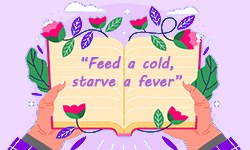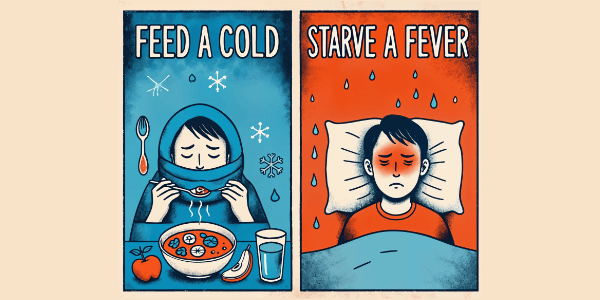
“Feed a cold, starve a fever” is a well-known proverb in the English language, with origins in medieval medical beliefs. This saying reflects an ancient approach to treating illnesses by adjusting one’s diet, suggesting that nourishment can help overcome a cold, while fasting may help during a fever. Understanding such sayings necessitates a grasp of historical and cultural contexts. This article gives a deeper understanding of how past societies approached health and wellness.
Definition: “Feed a cold, starve a fever”
“Feed a cold, starve a fever” is based on traditional beliefs about managing illnesses through diet. The saying suggests that when one has a cold, consuming nourishing food can help the body recover, while during a fever, reducing food intake might be beneficial to avoid overburdening the body. Though modern medicine does not strictly adhere to this advice, the proverb highlights an age-old approach to balancing dietary habits in response to different types of illnesses.
The examples below outline situations where the proverb “feed a cold, starve a fever” can be applied to provide a clear understanding of it in context:
In the scenarios above, the modern interpretation of the proverb “feed a cold, starve a fever” acknowledges that while the specific advice may not align with contemporary medical practices, the underlying principle emphasizes the importance of adjusting one’s diet and care according to the body’s needs during illness.
Explanation of the visual meaning
Left side (“feed a cold”)
The person is bundled up in a blanket, visibly suffering from cold symptoms. They are eating healthy food, such as soup, which symbolizes the idea of “feeding” the body to help recover from a cold.
The visual encourages nurturing and comforting oneself when experiencing a cold to alleviate it, hence the concept of “feeding a cold.”
Right side (“starve a fever”)
The person suffering from a fever is sweating and lying down, but there is no food nearby. This suggests the approach of avoiding food to prevent putting extra strain on the body.
The image conveys that during a fever, one should focus on resting and staying cool, minimizing the intake of food, which symbolizes “starving a fever.”

How to use it
“Feed a cold, starve a fever” is a traditional proverb often invoked in discussions about managing illnesses through diet. In modern contexts, the saying is typically mentioned in a reassuring or advisory manner, helping to convey practical wisdom passed down through generations. Whether it’s a parent caring for a sick child, a friend offering home remedies, or a health professional discussing old wives’ tales, this proverb serves as a reminder of the age-old belief that dietary adjustments can aid in recovery. The following examples illustrate various contemporary situations where this proverb might be applied.
This proverb may be used in the context of the doctor giving advice to the patient.
When reflecting on the historical progression in medicine, this proverb may be taken as a reference.
When analysing literacy, such as a novel, this proverbial phrase may be used to make a point.
As this proverb traces bag to the Middle Ages, it has been generationally passed down and thus, may be used in everyday context.
In the context of cultural commentary, like a TV show, this proverb can make an appearance in the niche of diet and health.
At the workplace, this advisory proverb, may be used in dialogue between colleagues.
In an educational setting, where a teacher aims to delve into historical medical beliefs, this proverb may be one example.
This proverb may be used as a marketing strategy to urge the consumers to buy their product.
Origin and history
The proverb “feed a cold, starve a fever” has its origins in medieval Europe, reflecting the medical beliefs and practices of the time. The saying first appeared in print in the 16th century. One of the earliest known mentions is from the 1574 dictionary “A Dictionary of the French and English Tongues” by Randle Cotgrave, where a similar sentiment is expressed. The idea behind the proverb stems from the humoral theory of medicine, which was prevalent from Ancient Greece through the Middle Ages. According to this theory, the balance of bodily fluids, or humors, is essential for health.
The belief was that different ailments required different treatments to restore balance. Feeding a cold was thought to warm the body and provide the energy needed to fight off the illness. Fasting during a fever was believed to prevent additional internal heat production and give the digestive system a rest, allowing the body to focus on fighting the infection.
Over time, as medical science advanced, the specific practices advised by the proverb have been questioned and largely set aside. However, the saying has persisted as a cultural artefact, reflecting historical approaches to healthcare and the enduring human inclination to find simple, memorable guidelines for managing common health issues.
Similar proverbs and synonyms
There are similar proverbs, reflecting traditional health advice or the wisdom of natural remedies. Below, you can find a list of widely known ones:
- An apple a day keeps the doctor away.
- Prevention is better than cure.
- A stitch in time saves nine.
- Early to bed and early to rise, makes a man healthy, wealthy, and wise.
- Laughter is the best medicine.
- You are what you eat.
- Health is wealth.
- Better safe than sorry.
- Nourish to flourish
- Eat well to get well
- Diet cures more than the doctor
- Healthy food, healthy recovery
- Sustenance speeds recovery
- Fuel the body to fight illness
- Food as medicine
- Proper diet aids healing
FAQs
This proverb suggests that eating well helps you recover from a cold, while eating less helps you manage a fever. However, this is an old saying which does not align with modern research about taking care of illness.
According to the saying “feed a cold, starve a fever,” it is better to eat when you have a cold and to fast, or eat less when you have a fever. However, modern medical advice generally emphasizes the importance of staying hydrated and maintaining a balanced diet, regardless of the type of illness.
- ✓ Free express delivery
- ✓ Individual embossing
- ✓ Selection of high-quality bindings
